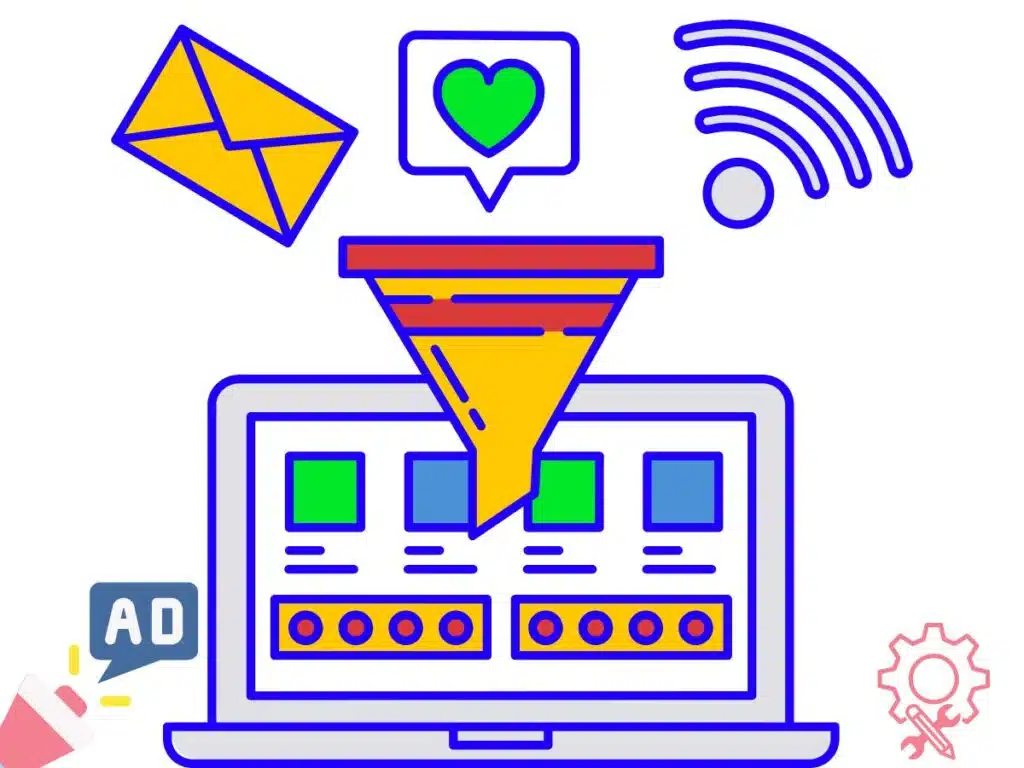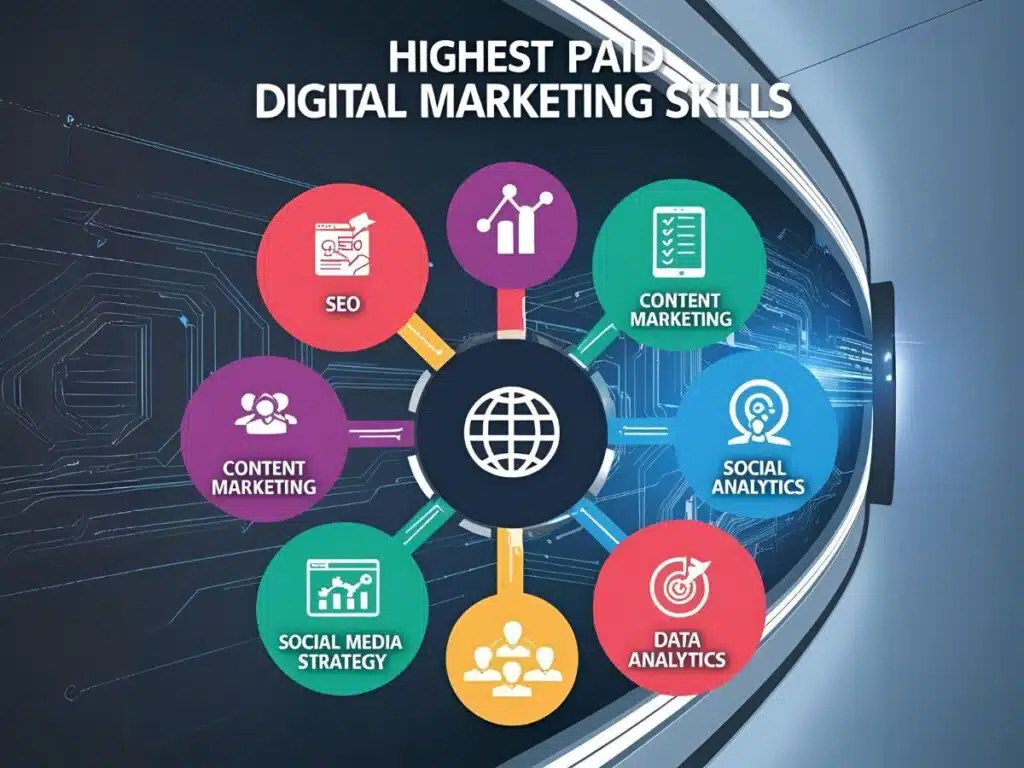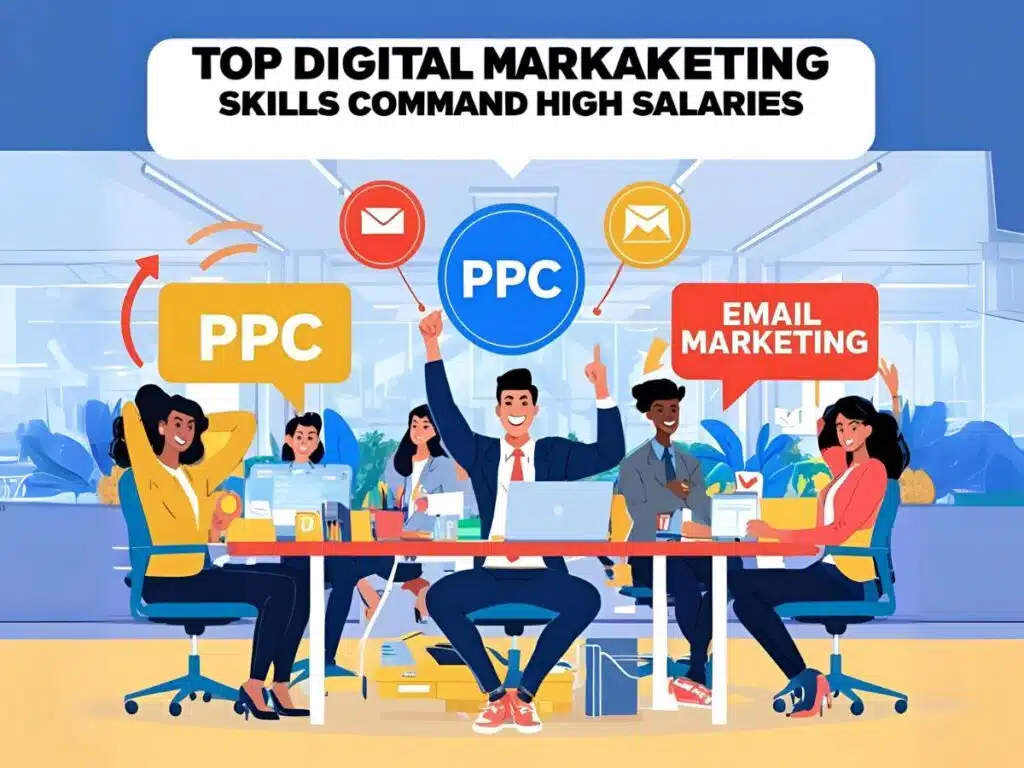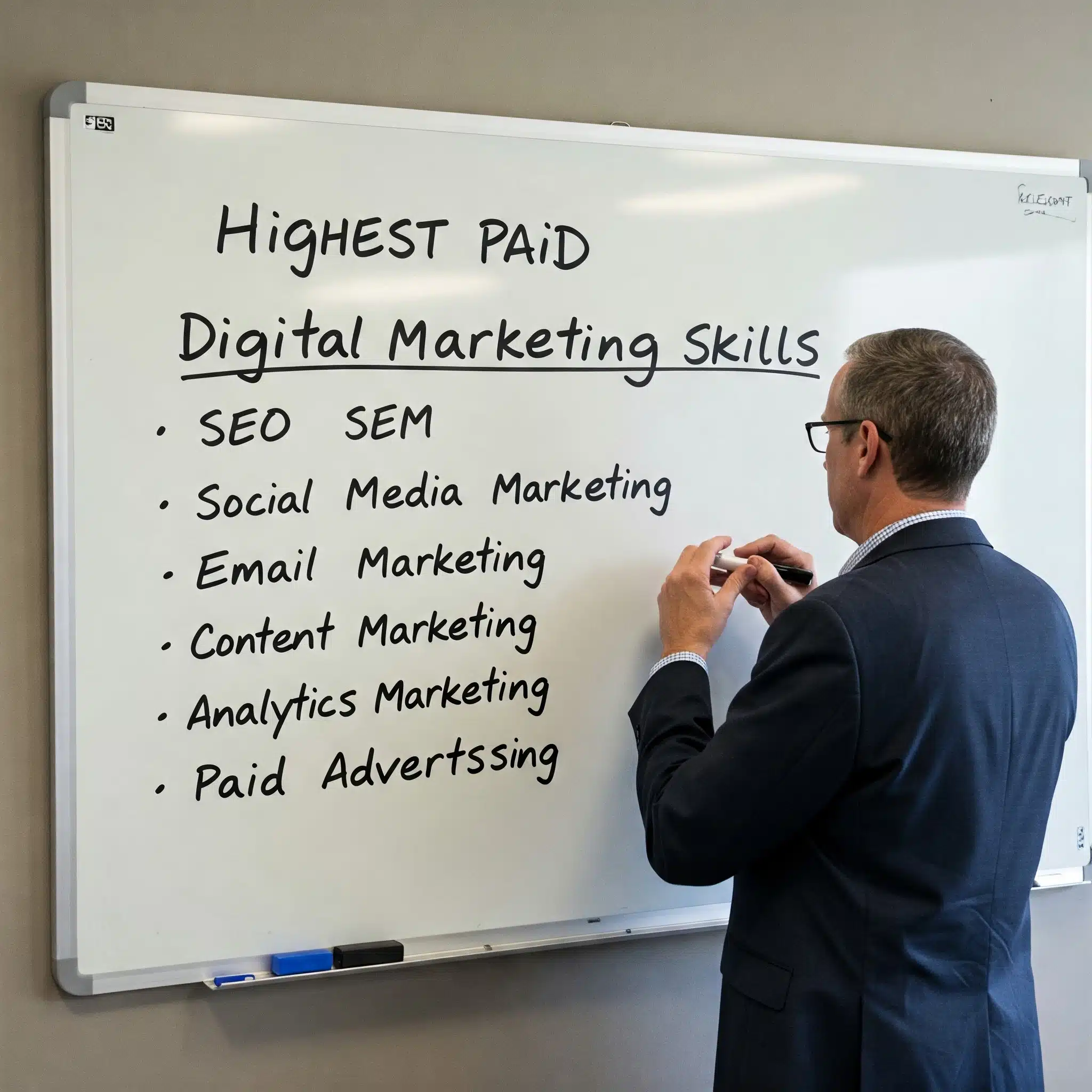Digital marketing is a dynamic and exciting field, constantly evolving with new technologies and strategies. It’s also a field ripe with opportunity, especially for those who cultivate the right expertise. While many roles exist, some specific skill sets command significantly higher salaries and offer more robust career paths. If you’re looking to maximize your earning potential and impact in this industry, focusing on the highest paid digital marketing skills is the smartest move you can make.
But what exactly are these skills? Why are they so valuable? And most importantly, how can you develop them? Whether you’re just starting or looking to pivot within the marketing world, this guide will walk you through everything you need to know about the most lucrative skills in digital marketing today. Let’s dive in and explore how you can position yourself for top-tier roles and compensation.
Introduction to High-Value Digital Marketing Skills
First off, why do some digital marketing skills pay more than others? It boils down to supply, demand, and impact. Skills that directly drive measurable business results (like revenue, leads, or significant cost savings), require specialized knowledge, or involve complex technologies tend to be valued more highly by employers.
The highest paid digital marketing skills often sit at the intersection of technology, data analysis, strategic thinking, and user understanding. They require more than just executing tasks; they demand the ability to strategize, optimize, analyze, and adapt in a fast-paced environment. Professionals possessing these skills are seen not just as marketers, but as crucial drivers of business growth, making them highly sought after and well-compensated. Understanding the landscape of in-demand marketing skills 2025 is your first step towards career advancement.

How These High-Paying Skills Work (With Examples)
Let’s break down some of the specific skills currently commanding top salaries and how they function in practice:
1. Artificial Intelligence (AI) in Marketing
- How it Works: This involves understanding and leveraging AI tools and concepts to enhance marketing efforts. It’s not necessarily about building AI, but applying it strategically. This includes using AI for predictive analytics (anticipating customer behavior), personalization (tailoring content and offers at scale), programmatic advertising optimization, customer service chatbots, and content generation assistance. Mastering marketing technology skills, especially AI platforms, is key.
- Example: A marketer uses an AI-powered CRM to analyze customer data and predict which leads are most likely to convert, allowing the sales team to prioritize outreach. They might also use AI tools to personalize email marketing campaigns based on individual user behavior, significantly boosting open and click-through rates.
2. Data Analysis & Analytics
- How it Works: This is the ability to gather, interpret, and translate marketing data into actionable insights. It goes beyond simply reading a Google Analytics report. It involves understanding statistical concepts, using advanced analytics tools (like Tableau, Power BI, SQL), tracking Key Performance Indicators (KPIs), performing A/B testing analysis, and communicating findings effectively to inform strategy. Data analysis for marketers is about finding the ‘why’ behind the numbers.
- Example: A marketing analyst dives into website traffic data, conversion funnels, and campaign performance metrics. They identify bottlenecks in the user journey, determine the ROI of different marketing channels, and provide recommendations to the team on where to allocate budget for maximum impact.
3. Advanced SEO Strategy & Technical SEO
- How it Works: This moves beyond basic keyword research. High-level SEO involves deep technical understanding (site architecture, crawlability, indexability, schema markup, site speed optimization), sophisticated content strategy (topic clusters, semantic SEO), link-building strategies, and adapting to complex search engine algorithm updates. It requires a holistic view of how search engines work and how users search. The SEO expert salary reflects this complexity.
- Example: An SEO strategist conducts a technical audit of a large e-commerce website, identifying issues hindering indexing. They then develop a content strategy focused on building authority around key product categories and implement schema markup to enhance search result visibility (rich snippets), ultimately driving significant organic traffic growth.
4. Performance Marketing & PPC Strategy (Pay-Per-Click)
- How it Works: While anyone can set up a basic Google Ad, high-paid PPC specialists excel at strategy, optimization, and budget management across platforms (Google Ads, Bing Ads, LinkedIn Ads, Meta Ads, etc.). This includes advanced bidding strategies, audience segmentation, conversion tracking implementation, landing page optimization testing, and maximizing Return on Ad Spend (ROAS). Strong PPC specialist skills involve both analytical rigor and creative testing.
- Example: A PPC Manager analyzes campaign performance data, identifying underperforming keywords and ad groups. They reallocate budget towards high-converting segments, implement automated bidding strategies focused on maximizing conversions, and A/B test ad copy variations to continually improve click-through and conversion rates.
5. Marketing Automation & CRM Management
- How it Works: This involves using software platforms (like HubSpot, Marketo, Pardot) to automate repetitive marketing tasks, nurture leads, personalize communication, and align sales and marketing efforts. Expertise lies in designing complex workflows, segmenting audiences effectively, managing lead scoring, integrating different marketing technologies (MarTech stack), and analyzing automation campaign performance.
- Example: A Marketing Automation Specialist designs an automated email nurturing sequence for new leads. Based on lead behavior (e.g., downloading specific content, visiting pricing pages), the system automatically sends tailored follow-up emails, assigns scores, and notifies the sales team when a lead becomes “sales-ready.”
6. High-Level Content Strategy
- How it Works: This is more than just writing blog posts. It’s the strategic planning, creation, distribution, and governance of content to attract, engage, and retain a target audience and drive business goals. It involves audience research, persona development, SEO integration, defining brand voice, mapping content to the customer journey, measuring content effectiveness (ROI), and managing content calendars across multiple channels. Content strategy jobs often require a blend of creativity and analytical skills.
- Example: A Content Strategist develops a comprehensive plan for a SaaS company. They identify key themes relevant to their target audience’s pain points, plan a mix of content formats (blog posts, webinars, case studies, white papers), ensure SEO optimization, and establish metrics to track how content contributes to lead generation and customer retention.
7. UX (User Experience) & CRO (Conversion Rate Optimization)
- How it Works: UX focuses on making digital products (websites, apps) easy and enjoyable to use. CRO focuses on optimizing those products to increase the percentage of users who take a desired action (e.g., purchase, sign up). Skills include user research, usability testing, wireframing, information architecture, A/B testing design, and data analysis specifically related to user behavior on-site.
- Example: A CRO Specialist uses heatmaps and user session recordings to see where visitors are struggling on a checkout page. They hypothesize that changing the button placement and simplifying the form fields will improve conversions. They design an A/B test, run it, analyze the results, and implement the winning variation, leading to increased sales.
Benefits of Acquiring These High-Paid Skills
Investing your time and effort into developing these specific skills yields significant rewards:
- Higher Earning Potential: This is the most obvious benefit. Skills in high demand and short supply naturally command better salaries. Targeting the highest paid digital marketing skills directly impacts your income ceiling. Check salary comparison sites for roles like “SEO Strategist salary” or “Marketing Data Analyst salary” to see the potential.
- Greater Job Security: Professionals with specialized, results-driven skills are less likely to be made redundant. Their expertise is often critical to a company’s success.
- Faster Career Advancement: Mastery of these areas often leads to more senior roles (Manager, Director, Head of Department) more quickly. It demonstrates strategic capability beyond basic execution, paving the path for digital marketing career growth.
- Increased Influence and Impact: You’ll be involved in more strategic decisions and have a greater ability to directly influence business outcomes, which can be highly rewarding.
- More Interesting and Challenging Work: These roles often involve problem-solving, strategic thinking, and continuous learning, making the day-to-day work more engaging.
- Flexibility and Remote Work Opportunities: Many of these roles are well-suited to remote work, offering greater flexibility in where and how you work.

Use Cases: Where These Skills Shine in Business and Marketing
These high-value skills aren’t just theoretical; they are applied daily in various roles and industries:
- SEO Strategist/Manager: Uses advanced SEO and potentially data analysis skills to drive organic growth for websites.
- PPC Manager/Paid Search Specialist: Employs performance marketing and data analysis skills to manage and optimize paid advertising campaigns.
- Marketing Data Analyst: Focuses purely on data analysis to provide insights across all marketing channels.
- Marketing Automation Specialist/Manager: Leverages automation platforms and CRM knowledge to streamline processes and nurture leads.
- Content Strategist/Manager: Uses high-level content strategy, SEO, and analytics skills to plan and measure content marketing efforts.
- Digital Marketing Manager/Director: Often needs a broad understanding of multiple high-value skills (SEO, PPC, Data, Strategy) to oversee entire campaigns and teams.
- Growth Marketer/Hacker: Combines data analysis, CRO, PPC, and creative thinking to rapidly experiment and find scalable growth channels.
- UX/CRO Specialist: Focuses on website/app usability and conversion optimization using data and user research.
- MarTech Specialist/Manager: Specializes in managing and integrating the company’s marketing technology stack, often requiring AI and automation knowledge.
These roles exist across virtually all industries, from tech startups and SaaS companies to e-commerce giants, agencies, and traditional corporations undergoing digital transformation.
Popular Ways and Platforms to Learn High-Paying Skills
Ready to start building your expertise? Fortunately, there are many accessible ways to learn digital marketing online and acquire these valuable skills:
- Online Course Platforms:
- Coursera/edX: Offer university-level courses and specializations in data science, AI, marketing analytics, and more.
- Udemy/Skillshare: Provide a vast range of courses on specific skills like Google Ads, Technical SEO, HubSpot, Tableau, etc., often taught by industry practitioners.
- LinkedIn Learning: Offers courses across various digital marketing disciplines.
- Industry-Specific Training:
- Google Skillshop: Free training and certifications for Google Ads, Google Analytics, etc.
- HubSpot Academy: Free courses and certifications covering inbound marketing, content marketing, marketing automation (using their platform), and more.
- SEMrush Academy/Ahrefs Academy: Offer courses focused on SEO and content marketing using their respective toolsets.
- Certifications: While not a substitute for experience, relevant certifications (e.g., Google Analytics IQ, Google Ads Certifications, HubSpot Certifications, Facebook Blueprint) can validate your knowledge.
- Bootcamps: Intensive, often immersive programs focused on specific areas like data science or digital marketing (though quality varies, so research carefully).
- Hands-On Experience: The best way to learn is by doing. Seek opportunities to apply these skills, even on personal projects, volunteer work, or entry-level roles. Experiment, track results, and learn from mistakes.
- Mentorship: Find experienced professionals in the field you want to specialize in. Learning from their insights and guidance can be invaluable.
- Industry Blogs and Communities: Stay updated by following leading blogs (e.g., Moz, Search Engine Journal, Content Marketing Institute) and participating in online communities.
Choose learning methods that suit your style and budget, but always prioritize practical application.
How to Build Your Own Skill Development Plan
Feeling overwhelmed? Break it down. Here’s how to create a roadmap to acquire the highest paid digital marketing skills:
- Self-Assessment: Honestly evaluate your current skills. What are you good at? Where are the gaps related to the high-value skills listed above? What genuinely interests you?
- Identify Your Target Skill(s): Don’t try to learn everything at once. Pick 1-2 high-value skills that align with your interests and career goals. Maybe you love data, so focus on Analytics. Or perhaps you enjoy technical challenges, making Advanced SEO a good fit.
- Research Roles and Requirements: Look at job descriptions for roles that require your target skill(s). What specific tools, techniques, and levels of experience are employers looking for? This helps define your learning objectives.
- Choose Your Learning Resources: Select relevant courses, platforms, or books based on your research. Mix theoretical learning with practical application tools.
- Set Specific, Measurable Goals: Instead of “learn SEO,” set a goal like “Complete Google Analytics IQ certification by end of Q3” or “Run a successful test PPC campaign for a personal project within 2 months.”
- Allocate Time: Schedule dedicated time for learning and practice. Consistency is key. Even 30-60 minutes a day can make a huge difference over time.
- Practice, Practice, Practice: Find ways to apply what you learn. Start a blog to practice SEO and content strategy. Offer to help a non-profit with their Google Ads. Analyze data from your current role (if applicable). Build a portfolio showcasing your projects.
- Seek Feedback and Network: Share your work, ask for critiques, and connect with people in the field. Attend webinars, join LinkedIn groups, or go to (virtual or local) industry meetups.
- Stay Curious and Adapt: The digital landscape changes rapidly. Commit to continuous learning to keep your skills sharp and relevant. Follow industry news and be prepared to learn new tools and techniques.
Specialize in digital marketing areas that excite you and offer growth potential ( highest paid digital marketing skills ) – this is the foundation of a successful development plan.

Conclusion: Invest in Your Future – Start Developing High-Value Skills Today!
The digital marketing field offers incredible career opportunities, but the highest rewards go to those with specialized, in-demand expertise. Focusing on acquiring and honing the highest paid digital marketing skills – like AI application, data analysis, advanced SEO, PPC strategy, marketing automation, content strategy, and UX/CRO – is a direct investment in your future earning potential and career trajectory.
These skills require dedication to learn and master, blending technical know-how with strategic thinking and a deep understanding of data. But the benefits – higher salaries, greater job security, faster advancement, and more impactful work – are well worth the effort.
Don’t wait for the landscape to change around you. Take action now. Identify the skill that most excites you, create your learning plan using the steps above, and commit to consistent practice and application. The sooner you start building these high-value competencies, the sooner you’ll unlock the door to top-tier digital marketing roles and rewards.
Frequently Asked Questions: highest paid Digital Marketing Skills (India, 2025)
What are the highest paid digital marketing skills currently?
Currently, several specialized areas in digital marketing command high salaries. These prominently include deep expertise in data analysis and analytics for interpreting performance and guiding strategy, along with the practical application of artificial intelligence in marketing for tasks such as personalization, predictive modeling, and automation. Advanced search engine optimization, which covers technical site aspects and sophisticated strategy, is also highly valued. Furthermore, performance marketing roles focused on optimizing paid advertising campaigns like PPC for maximum return on investment, proficiency with marketing automation platforms and CRM systems, and the ability to develop high-level content strategies tied directly to business objectives are all considered top-paying skill sets.
Why do these specific digital marketing skills command higher salaries?
These particular skills are highly valued, leading to better compensation for several key reasons. Primarily, there is significant market demand for professionals possessing this deep expertise, often exceeding the current supply of qualified individuals. Additionally, proficiency in areas such as performance marketing, advanced SEO, or data analytics enables marketers to clearly demonstrate their direct impact on crucial business outcomes like revenue growth, lead generation, and customer acquisition cost reduction. The inherent technical complexity involved in mastering these skills and their associated platforms, combined with their strategic importance in decision-making, also contributes significantly to their higher market value.
Do I need to master all of these skills to earn well in digital marketing?
It’s generally not necessary to become an expert in every single high-paying skill to build a successful and well-compensated career in digital marketing. While having a broad foundational understanding of the overall digital marketing landscape is certainly beneficial, deep specialization in one or two key areas often leads to greater expertise and significantly higher earning potential. Many top professionals focus their efforts on becoming true masters in a specific field, such as marketing data science or technical SEO, rather than attempting to cover all specialized areas at a surface level.
What salary can I realistically expect in India with these skills in 2025?
Salary expectations in India for roles demanding these high-value skills can vary considerably. Factors influencing compensation include your years of experience, the specific responsibilities of the role, the size and industry of the company, your geographic location within India (salaries in major metropolitan areas like Bangalore, Mumbai, or Delhi NCR are often higher than in cities like Madurai, for instance), and importantly, your proven track record of delivering results. As a general guideline for 2025, entry-level positions related to these skills might offer salaries ranging from approximately 3 to 6 Lakhs per annum (LPA). Mid-level professionals with several years of focused experience could typically expect earnings between 8 and 15 Lakhs LPA or potentially more. For senior-level experts, managers, and strategists with significant experience and proven impact, salaries often range from 15 to 25 Lakhs LPA and can substantially exceed this in leadership positions or highly niche specializations within top-tier companies.
How can I effectively learn and develop these high-paying digital marketing skills?
Developing expertise in these valuable skills usually requires a multifaceted approach. Structured learning through reputable online courses offered by platforms such as Coursera, edX, HubSpot Academy, or Google Skillshop can provide a strong theoretical foundation. Obtaining relevant, industry-recognized certifications, like those offered by Google or HubSpot, helps validate your knowledge to potential employers. However, the most critical component is gaining substantial hands-on experience; you need to actively apply what you learn through real-world projects, internships, volunteering, personal websites, or responsibilities within your current job. Building a portfolio that clearly showcases your projects and quantifiable results is essential. Furthermore, given the rapid pace of change in digital marketing, committing to continuous learning by following industry publications, thought leaders, and participating in relevant communities is vital for staying current.
Is a specific university degree mandatory to get these high-paying digital marketing jobs?
While possessing a relevant university degree, perhaps in fields like Marketing, Business Administration, Communications, Computer Science, or Statistics, can certainly be advantageous and is often preferred by some employers, it is not always a strict prerequisite for securing high-paying roles in digital marketing in India today. Many companies, especially in the tech and startup sectors, increasingly prioritize demonstrable skills, practical experience gained through actual work, a compelling portfolio that showcases your achievements and results, and relevant industry certifications over specific formal educational qualifications. In this dynamic field, proven ability and tangible results often carry significant weight.












